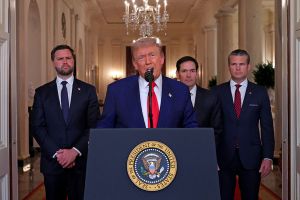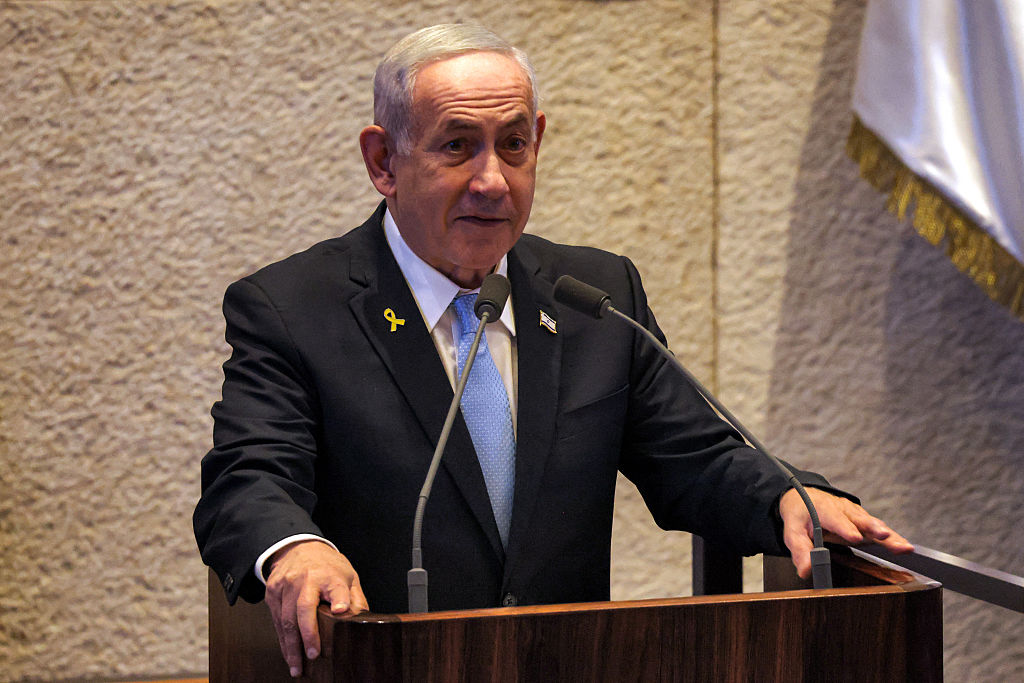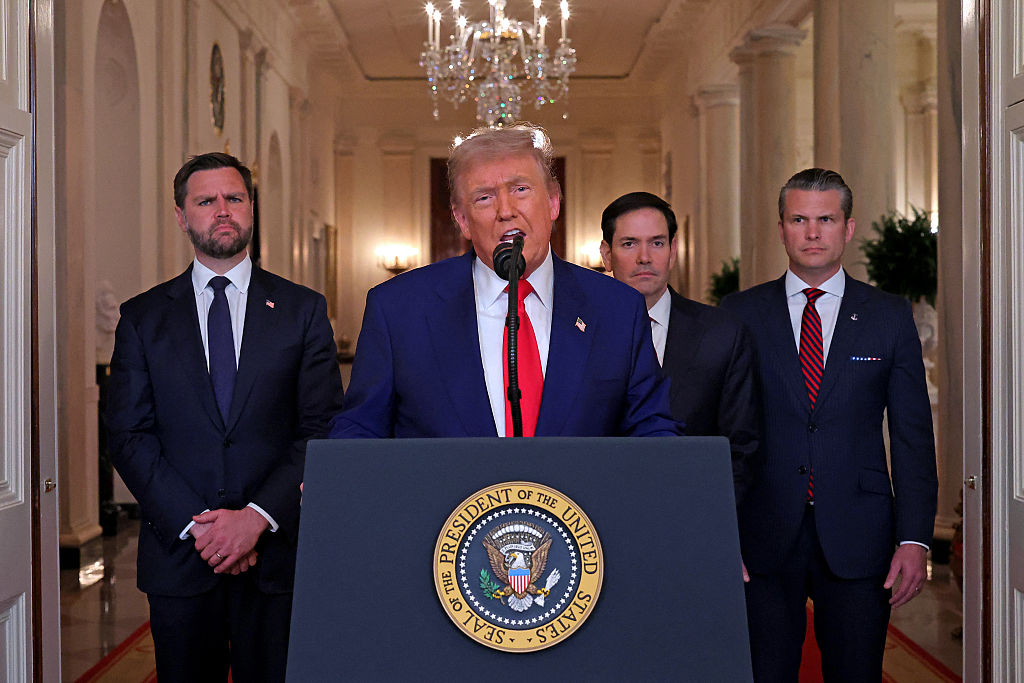A striking generation gap in the western world has been revealed by the responses to the October 7 atrocities in Israel. Noting in these pages the surge in pro-Palestinian sentiment among young people on both sides of the Atlantic, my old friend Douglas Murray worries that “When it comes to Palestine, the kids aren’t all right.”
Murray is correct to say that something has changed. He is also correct that it is mainly a phenomenon in the English-speaking world. In the US and the UK, young people are far less well-disposed towards Israel than a decade ago.
The Daily Express condemned ‘the woozy-minded communists and sexual indeterminates of Oxford’
“Do you sympathize more with Israelis or Palestinians?” Quinnipiac asked its voter sample last month. Of those aged from eighteen to thirty-four, 52 percent said the Palestinians, and 29 percent the Israelis. In 2013, however, 55 percent of millennials (those born between 1980 and 2000) sympathized with Israel and just 12 percent with Palestine.
The picture is similar in the UK. According to opinion polls, 42 percent of Britons aged eighteen to twenty-four say they sympathize more with the Palestinians in the current conflict, compared with just 7 percent who support Israel. For those aged sixty-five and over, the proportions are roughly reversed. YouGov data from ten years ago confirms that there has been a swing towards Palestine. In 2014, 25 percent of eighteen- to twenty-four-year-olds sympathized more with Palestine and 10 percent with Israel — not radically different percentages from the sixty-five-plus age group.
Over the past ten years, the issue has become deeply partisan, due in part to the spread of leftist “decolonization” narratives in higher education — surreptitiously displacing “never again” narratives about the Holocaust — as well as to Donald Trump’s strong support for Israel during his first term in the White House. This divide in the Anglosphere is clearly a problem for Israel itself, which has relied heavily since its birth on US backing — and sympathy, if not large-scale support, from the rest of the English-speaking world.
But it could also prove to be a problem for the US and the UK too. As the Muslim shares of their populations rise, other issues of concern to these growing minorities are bound to arise. Will the younger generation of the indigenous inhabitants be so easily mobilized on those issues? In his 2015 novel Soumission, Michel Houellebecq satirically imagined the political class in France capitulating to the Islamists and obligingly adopting sharia law. Perhaps he chose the wrong country.
And yet isn’t it always the case that the politics of the student-age population infuriates those whose university days are decades behind them? Douglas Murray is, gallingly, a lot younger than I am — forty-four to my fifty-nine — but it is still more than twenty years since he was an undergraduate at Magdalen College, and closer to forty years since I was. Let us Oxonian oldies therefore remind ourselves of another occasion when the kids did not seem to be all right.
Just over ninety years ago, on February 9, 1933, the Oxford Union debated and carried by 275 votes to 153 the motion “That this House will in no circumstances fight for its King and Country.” The result of the debate went viral, as we would now say. In the US, any resolution to take no part in war soon came to be known as the “Oxford Pledge.”
Then, as now, the older alumni fumed. Just days after the debate, the Daily Telegraph carried a ferocious letter signed “Sixty-Four” under the headline “disloyalty at Oxford: gesture towards the reds.” The news of the vote, thundered Sixty-Four, “must have been read with feelings of shame and disgust by thousands of Oxford men.” It was “an outrage upon the memory of those who gave their lives in the Great War.”
Sixty-Four turned out to be a Telegraph leader-writer, J.B. Firth. Then aged — yes — sixty-four, Firth was just as you might imagine him. In 1908 he’d edited an anthology of Oxonian verse called The Minstrelsy of Isis. His magnum opus was a life of Constantine the Great.
The even crustier sculptor Sir Alfred Gilbert, seventy-eight, wrote in similar terms to the Morning Post: “What is England coming to, when those who may in the future become her legislators behave themselves now like unruly children in a nursery and openly preach lèse-majesté, sedition and treason?” The Evening Standard’s “A.A.B.’s column” — written by A.A. Baumann, seventy-seven — speculated that “half the majority [in the Union vote] would turn out to be foreigners and half ‘non-ascripts’ [sic].” Employing more familiar vocabulary, the Daily Express condemned “the woozy-minded communists, the practical jokers and the sexual indeterminates of Oxford.”
A future prime minister also took notice. Addressing the twenty-fifth anniversary meeting of the Anti-Socialist and Anti-Communist Union on February 17, 1933, Winston Churchill, aged fifty-eight, denounced the “abject, squalid, shameless avowal” by “callow, ill-tutored youths.” The vice-chancellor of the university, Francis Lys, warned the Union president, Frank Hardie, that he had besmirched the good name of Oxford.
The indignation had an edge. Hitler had become chancellor of Germany just ten days before the debate was held. A year later, Alfred Zimmern, professor of international relations at Oxford, wrote to Hardie: “I hope you do penance every night and every morning for that ill-starred Resolution. It is still going on sowing dragons’ teeth. If Germans have to be knocked out a second time it will be partly your fault. The bully believes we are ‘decadent.’”
On September 25, 1939 — three weeks after Britain had been obliged, as Zimmern foresaw, to declare war on Germany once again — even the liberal New York Times wondered “to what extent Hitler’s political policies had been influenced by a conception of the British temper based on episodes like the Oxford Pledge.” After the war, Churchill expressed similar sentiments — though the evidence that the debate greatly influenced the thinking of either Hitler or Mussolini was slender to say the least.
Since October 7, there has been comparable outrage in the United States over pro-Hamas and/or anti-Israel statements by student groups like the thirty-four at Harvard who sought to hold Israel “entirely responsible” for the terrorists’ sadistic rampage. They don’t have a student debating society at Harvard, but if they did, any motion condemning Israel over its response to the October 7 attacks would be carried easily.
The response of alumni has unconsciously echoed the indignation of older Oxford men in 1933. The hedge-fund manager Bill Ackman demanded that the Harvard students who had defended Hamas be named so that he and others could be sure not to hire them. Other CEOs mirrored Ackman’s call. Ken Griffin, who earlier this year gave $300 million to Harvard, was one of a number of big donors who urged the university’s president, Claudine Gay, to issue a stronger statement condemning the terrorists than her initial bromide.
So what is the difference between 2023 and 1933? Part of the answer is that the Oxford Union debate — which appears in almost every school and university textbook on the subject of interwar pacifism and appeasement — was not what it appeared to be.
It is true that Oxford had moved to the left since the 1920s. The onset of the Depression, the fashionable appeal of socialism and communism, and the admission of more grammar-school boys had dispelled forever the indulgent atmosphere that Evelyn Waugh later nostalgically recalled in Brideshead Revisited. Hardie, the Union president, was a typical Oxonian of the 1930s. Educated at Westminster, he was also chairman of the Labour Club. Yet his most enduring contribution to our national life was a book on the political role of Queen Victoria.
The original idea for a pacifist motion came from the Union’s librarian, David Graham. But he was no leftist. Rather, he was a member of the Oxford Group, a Christian organization founded by the American Lutheran Frank Buchman in 1921. Graham and Buchman even traveled to Germany that summer in the hope of promoting better relations with Hitler’s government. (The Fuhrer declined to meet them, a chance he presumably would not have left slip if the King and country debate had really mattered to him.) The true leftist among the Union officers in 1933 was in fact Michael Foot, the treasurer and future Labour leader. But it does not seem that Foot spoke in the debate.
It also proved far from easy to recruit supporters of the motion. Whereas Quintin Hogg, the son of the then secretary of state for war, Viscount Hailsham, rushed to accept an invitation to oppose it, Hardie was turned down four times by people he asked to support it, including Norman Angell and Bertrand Russell, before he alighted on C.E.M. Joad, then in his forties. A popular philosopher who later became a household name on the BBC’s Brains Trust, Joad was the chairman of the philosophy department at Birkbeck College.
As for the undergraduate speakers, David Graham seconded the motion, which was proposed by Kenelm Hubert Digby (who went on to be attorney general of Sarawak). On the other side was Keith Steel-Maitland, the son of the Tory MP and former party chairman Sir Arthur Steel-Maitland.
The opponents of fighting for King and country in 1933 by and large did their bit for both after 1939
Hogg confidently expected to win and took the result “very badly.” Those present attributed the vote less to widespread pacifist sentiment than to Joad’s highly entertaining style at the despatch box. He made the audience laugh, telling the well-known story of Lytton Strachey’s response when asked during the first world war what he, a conscientious objector, would do if a German were raping his sister. “I should try and come between them,” Strachey had archly replied. Joad made his listeners flesh creep with wildly exaggerated claims about German air power. (“A single bomb from an aeroplane could poison every living thing within an area of three-quarters of a square mile.”) And he made them marvel, proposing Mahatma Gandhi as a role model in the event of a German invasion of England.
Yet there were plenty of undergraduates who were as indignant as Firth and Churchill. The former’s call on “Young Oxford… to get this offensive motion expunged from the minutes of the Union Society” was quickly answered by a group of recent members, including Churchill’s son Randolph. On February 15, a box containing 275 white feathers was delivered to the Union, one for each vote in favor of the motion. The following day, when the Union met for its next debate, twenty undergraduates interrupted proceedings, seized the minute book, tore out the offending minutes and left. The perpetrators were swiftly identified as rowers from St. John’s and Worcester colleges, some of them professed fascists.
It’s important to note that at the Oxford Union, wit is generally preferred to sincerity. When the secretary appeared helpless to prevent the ripping out of the controversial minutes, the Russian émigré Prince Lieven piped up: “Although you may not have been willing to fight for King and country, I think you might have been willing to fight for the society’s minute book.”
When it came to another vote on whether or not to expunge the resolution, Hardie carried the day with an eloquent defense of the Union’s independence and an attack on the press coverage of the original debate. The margin of victory in this case was much larger — just 138 for the expunging and 750 against — suggesting that the Union members were at least ready to fight to preserve the independence of their debating society.
With the passage of time, in any case, the true seriousness of the threat posed to Britain by Hitler grew inexorably more apparent. When Joad returned to Oxford in November 1938 to oppose the motion “That war between nations can sometimes be justified,” he found a new constellation of political forces. Proposing the motion now were a socialist and a liberal; on Joad’s side, the university magazine Isis noted, was “as Tory-looking a bunch as the Union could produce.” This time, Joad was defeated by 176 votes to 145.
The opponents of fighting for King and country in 1933 by and large did their bit for both after September 3, 1939. At the outbreak of war, Michael Foot volunteered for military service, but was rejected because of his asthma. In 1940, under the pen-name “Cato,” he and two other journalists published Guilty Men, a polemic against the policy of appeasement. After Oxford, David Graham joined the BBC and worked for the German department during the war, broadcasting anti-Nazi propaganda to those intrepid citizens of the Third Reich willing to risk listening to the BBC. He later covered the liberation of the Theresienstadt concentration camp.
The playwright Terence Rattigan had been one of the undergraduates who had voted for the 1933 motion. By 1940 he had joined the Royal Air Force and became a rear gunner and radio operator with the rank of flight lieutenant.
Another of the young men who attended that infamous debate was the future US Secretary of State Dean Rusk. As he recalled thirty years after the event: “It was apparent to most of us present that the vote was a compliment to the entertaining brilliance of C.E.M. Joad rather than a verdict on the merits of the issue. Although the Union was not amused by a later effort to expunge the record, the record was set right… within a few short years by the gallantry of its members in fighting for King and country, and for freedom.”
We must ask ourselves: will the same prove to be true in our time? If push came to shove — if the terrorists of Hamas and Palestinian Islamic Jihad took to butchering British men, women, and children — would their youthful apologists in the Anglosphere reconsider their position?
It is a hard question to answer with confidence. The current generation of undergraduates hold strong views with weak foundations. At least some of the pro-Palestinian demonstrators last month proved to be, when questioned, almost wholly ignorant about the situation in and around Gaza. Yet their ignorance does not make them more circumspect; rather the reverse.
Today’s students complain about not being able to speak their minds in class, yet many of them would also accept an authoritarian system of government if it could be relied upon to avert climate change. They insist on the importance of tackling global warming, yet seem strangely reluctant to criticize China and India (members of the sacrosanct “Global South”) for their massive contributions to CO2 emissions. They were eager to adopt the Ukrainian cause in early 2022, but of late we hear strangely little from them about the need to send more weapons to Kyiv. I therefore have my doubts about their ability to recognize that Iranian proxy organizations are unlikely to be their generation’s most reliable allies in the years ahead.
But we shall see — just as “Sixty-Four” eventually saw in 1939. I hope he was pleasantly surprised. I hope Douglas Murray and I will be too. We are getting a bit long in the tooth to fight for King and country ourselves.
This article was originally published in The Spectator’s UK magazine. Subscribe to the World edition here.


























Leave a Reply